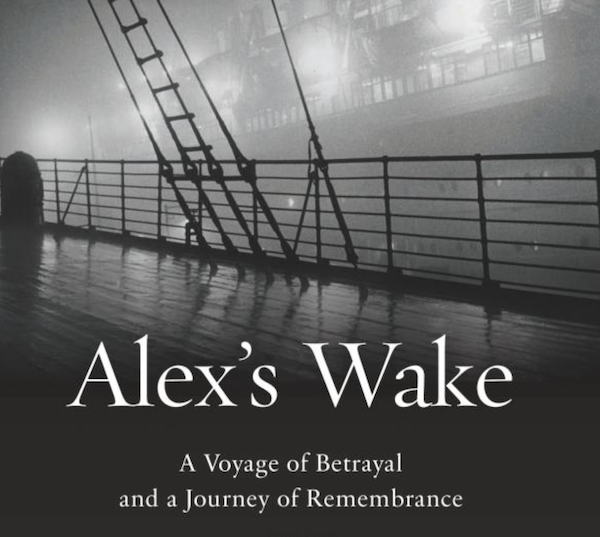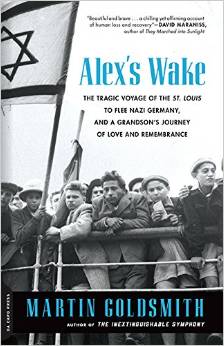My Relatives Were on the Ill-fated Jewish Refugee Ship, the St. Louis

In the spring of 2011, my wife and I embarked on a six-week journey through Germany, France, and Poland, following in the footsteps of my grandfather and uncle. Theirs was not a pleasant jaunt, however . . . far from it. Grandfather Alex Goldschmidt and Uncle Helmut Goldschmidt had attempted to flee Nazi Germany in 1939 on board the infamous Jewish refugee ship known as the St. Louis. Forced to return to Europe by the indifference of the governments of Cuba, the United States, and Canada, my relatives disembarked in France and spent the following three years in a half-dozen French camps before being shipped to their deaths at Auschwitz in 1942. Our journey, which wound its way over 5,700 miles, was an endeavor to bear witness and also to free myself from a legacy of guilt and shame that I'd come to see as my emotional inheritance. My father and mother managed to escape to New York City in June of 1941, but the fact that his parents and his brother and sister were four of the millions of victims of the Holocaust haunted my father for the rest of his life. My journey was, in part, an attempt to steer my way clear of the turbulent emotional waters of Alex's wake in which I'd been foundering for most of my adult life.
 We began in the place where Alex's life journey commenced: Sachsenhagen, the village in Lower Saxony where he was born. I had prepared for our arrival by contacting Theodore Beckmann, a member of the village's historical society. Thanks to his research and a visit to the town archives, I learned a great deal about the important role the Goldschmidt family had played in Sachsenhagen for more than a century.
We began in the place where Alex's life journey commenced: Sachsenhagen, the village in Lower Saxony where he was born. I had prepared for our arrival by contacting Theodore Beckmann, a member of the village's historical society. Thanks to his research and a visit to the town archives, I learned a great deal about the important role the Goldschmidt family had played in Sachsenhagen for more than a century.
My great-great grandfather, Levi Goldschmidt, was born in 1799 and moved to Sachsenhagen in 1834. He made a considerable living as a Pferdehaendler, a dealer of horses, an occupation that Jews were allowed to practice while other professions were closed to them. When he died in 1859, Great-Great-Grandfather Levi was remembered on the headstone of his grave in the village's small Jewish cemetery as decent, honest, and just. He had also acquired a reputation for magnanimity: he had made gifts to the community that amounted to more than the value of his considerable property, which included a grand house in town and several fields in the nearby countryside.
Levi's eldest son, my Great-Grandfather Moses Goldschmidt, inherited the family business and turned it into a runaway -- one might even say a galloping -- success. He quickly established himself as a pillar of the community, remembered by his neighbors as a kind, generous man and also something of a character, a "Sachsenhagen original." That's the term used by a long-time resident of the village, who wrote a memoir at the dawn of the twentieth century:
The horse dealer Moses Goldschmidt lived behind our house, over on Mittelstrasse. Whenever Goldschmidt received a shipment of horses he'd place a notice in the newspaper. And when a potential buyer came by to look at the horses, Goldschmidt would have the animals pranced through the streets of Sachsenhagen. He would stand in front of his house, smiling, smoking a big cigar, and cracking his whip smartly.
That house on Mittelstrasse, which still stands today, is one of the oldest houses in Sachsenhagen, built by a master carpenter in the seventeenth century. When Moses, his wife Auguste Philippsohn, and their eight children lived there, it must have been among the jewels of local architecture. It could boast of something only a few other homes could claim, a baker's oven. On the roof of the house there were two wooden planks on which, every spring, a pair of storks would build a nest and care for their young throughout the languid days of summer until the whole family would depart in September in search of a winter refuge farther south.
Inside the big house resided not only Moses, Auguste, and the children, but also four servants: a butler, a valet, a maid, and a housekeeper. There was nearly always a fire burning in the big oven, keeping the house comfortably warm in the winter. And the Jewish holidays were strictly observed. It was into these secure and prosperous surroundings that Grandfather Alex, the seventh of his family's eight children, was delivered on New Year's Day, 1879. He would not enter the family business, however, but rather move north to establish a women's clothing store in the city of Oldenburg.
Alex and his siblings returned to Sachsenhagen for Moses's funeral, following the patriarch's death on April 15, 1908. Given the resources at hand, it must have been a lavish affair. Great-Grandfather Moses's estate was valued, in today's currency, at a little over seven million dollars. But death comes for rich and poor alike. His headstone in the little Jewish cemetery reads, in Hebrew, "Here lies Moses Goldschmidt, a god-fearing man. He loved justice and followed the road of righteousness. He fed the hungry. He died on a Thursday, the first day of Pesach 5668."
All these facts I learned during two days spent walking through the village and poring over records in the tidy village archives. But I also learned a great deal more than the facts; I acquired a full measure of the truth about my vanished family. It was with a potent mixture of pride and melancholy that I visited the Jewish cemetery and placed small stones of remembrance on the graves of Levi and his wife Johanna Frank and those of Moses and Auguste.
Leaning on the top rail of the iron fence that encloses the cemetery, I gazed across the fields and tried to imagine my family living on this land with horses as our livelihood. I recalled my father telling me about the few times he had visited his grandfather's house and how every year he would eagerly await the return of the storks to their snug nest on the roof. There was peace in my father's eyes as he shared this precious memory and, under a cloudless springtime sky, I began to understand that there is more to my story than murder, loss, sorrow, and shame. There is honor and respect for a job well done; there is a certain standing in a single community over multiple generations; there is success, wealth, and a large, well-cared-for family; and there is a pair of storks that return in the spring, bringing forth precious new life.
There would be many more discoveries over the next six weeks, but this was a wonderful way to begin. "The past is never dead; it isn't even past," wrote William Faulkner. And time is a two-way mirror. What will you find reflected on your journey?
© 2015 Martin Goldsmith, author of Alex's Wake: The Tragic Voyage of the St. Louis to Flee Nazi Germany -- and a Grandson's Journey of Love and Remembrance